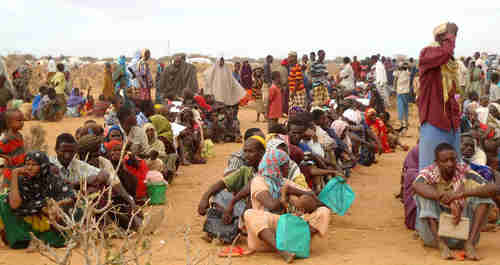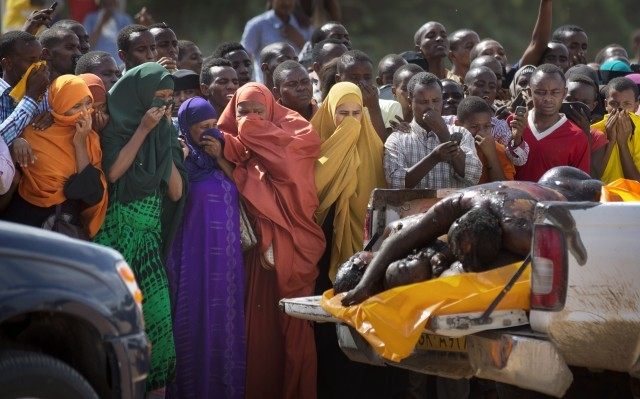This morning’s key headlines from GenerationalDynamics.com
- Desperate Kenya demands closure of refugee camp after Garissa school attack
- Pakistan hits back at UAE over Yemen war military support issue
Desperate Kenya demands closure of refugee camp after Garissa school attack

Dadaab refugee camp in Kenya, the largest in the world
On April 2, The Somalia terrorist group al-Shabaab massacred over 147 people, mostly Christian students, at Garissa University College in Kenya. That event, according to Kenyan officials themselves, has caused a reaction on Kenya very similar to the effect of the 9/11/2001 attack on America.
Kenya’s government has announced two major actions targeting Somalians in particular.
First, Kenya on Wednesday suspended the licenses of major Somali money transfer firms in Nairobi, in an effort to curb the financing of al-Shabaab from remittances sent from Kenya. This suspension has been bitterly criticized not only by Somalis and but also by aid agencies that depend on the money transfer firms to transfer money used for humanitarian and development operations. Somalia is one of the poorest countries in the world, and millions of people depend on remittances from their family members who moved to other countries to find work and send money back. An end to the remittances will hurt a lot of people, without increasing security.
Second, on Saturday, Kenya’s government demanded that the United Nations close the Dadaab refugee camp in Kenya, the largest refugee camp in the world, with 300,000 to 600,000 people, mostly Somalis, and move the camp and the residents into Somalia.
According to Deputy President William Ruto:
We have asked the UNHCR to relocate the refugees in three months, failure to which we shall relocate them ourselves. The way America changed after 9/11 is the way Kenya will change after Garissa.
Kenya is in an emergency situation… Each country has an obligation to look after its people first.
However, it is doubtful that these measures, even if enacted, will reduce the risk of terrorist acts against Kenya. Even the idea of building a 700 km fence along the border separating Kenya from Somalia, something that is being discussed as a measure of desperation, would be unlikely to prevent another attack.
The Dadaab camp was established in 1991 to house refugees from Somalia’s civil war. Since then, a whole new generation of children have grown living in the camp. Since they are not allowed to leave the camp, they cannot get an education or a job. So the Dadaab camp has become a fertile ground for recruitment by al-Shabaab, and also a place to hide out in preparation for an attack on a Kenyan target. The investigations following the Garissa school attack confirmed that that is happening.
Ironically, there is little evidence that the Garissa attack has increased xenophobic feelings between Muslims and Christians in Kenya. However, these acts directed at ordinary Somalian people are certain to increase mutual xenophobia between Kenyans and Somalis, creating a situation that may lead eventually to war. AFP and Al-Jazeera and The Nairobian and Clapway
Pakistan hits back at UAE over Yemen war military support issue
Tensions are increasing between United Arab Emirates (UAE) and Pakistan over the latter’s apparent refusal to provide military help in Operation Decisive Storm, the Saudi Arabia-led military action against the Houthis in Yemen.
Saudi Arabia’s King Salman at the end of March made a formal request of Pakistan’s prime minister Nawaz Sharif to provide military help. After days of debate, Pakistan’s parliament voted unanimously to reject the request and help the warring factions in Yemen to resolve their differences through dialogue.
UAE’s foreign affairs minister Anwar Mohammed Gargash angrily that “The vague and contradictory stands … are an absolute proof that Arab security — from Libya to Yemen — is the responsibility of none but Arab countries.” ( “12-Apr-15 World View — Repercussions start for Pakistan’s and Turkey’s neutrality in Yemen”)
On Sunday, Pakistan hit back at the UAE.
Pakistan’s interior minister Chaudhry Nisar Ali Khan accused UAE of “hurling threats”:
This is not only ironic but a thought-provoking moment that a minister of UAE is hurling threats at Pakistan. The statement of the UAE minister is in stark violation of all diplomatic norms prevalent according to the principals of international relations.
Pakistan is an honored nation and has brotherly emotions for the people of UAE along with Saudi Arabia, but this statement of an Emirati minister is equal to an offense against the ego of Pakistan and its people and is unacceptable.
This is a very interesting statement because it is like a husband asking his wife if she is having an affair, and in response she screams, “You don’t love me any more.”
Khan’s statement expresses how deeply hurt Pakistan is to hear such a thing from the “brotherly” people of UAE, but it does not respond to UAE’s criticism that Pakistan is willing to accept all kinds of help and support from Saudi Arabia, but when the Arab security is at stake, the Arabs are on their own.
An editorial appearing in a leading UAE newspaper lists many of the ways that Pakistan has benefited by aid from UAE’s Pakistan Assistance Program (PAP) which build roads, bridges, 64 water treatment and purification plans, schools, colleges, vocational training institutes, hospitals, clinic and medical institutes.
The editorial says that Pakistan’s refusal to join the Saudi-led operations in Yemen could have serious consequences for its relations with the UAE. Furthermore:
Pakistan’s decision, if it was made final, not only compromises the security of long-standing allies and friends, but also could undermine its own stability. The success of the operation in Yemen will not only remove the Houthi threat, but will also aim to destroy Al Qaeda’s stronghold there, which would have consequences far beyond the Arabian peninsula.
It might also lead to a situation of mistrust between old friends, Pakistan and the GCC countries, that have co-operated for decades on military and security issues.
This is a very interesting situation because you can see the clash of two opposing themes in many countries of the world.
On the one hand, whether it’s Barack Obama in Syria, Angela Merkel in Ukraine, or Pakistan and Turkey in Yemen, there’s a fear of “getting involved,” and a willingness to appease rather than confront, as in the legendary case of Britain’s Neville Chamberlain and Nazi Germany.
On the other hand, there are very strong nationalistic and xenophobic feelings being exhibited in other countries, such as Saudi Arabia and UAE in Yemen, China in the South China Sea, and Russia in Ukraine.
In the end, choosing between appeasement and war is a “Hobson’s choice,” because in a generational Crisis era, appeasement is not an choice that’s available for long. Appeasement in this era appears as weakness, and only encourages further nationalism and belligerence on the part of the countries not practicing appeasement.
In the case of Pakistan, the choice is between a continuing major political embarrassment with UAE and Saudi Arabia, versus military involvement in Yemen. If the best that the Pakistanis can do in response to the request is to whine about “an offense against the ego of Pakistan and its people,” then the political choice is not going to be available for long. AFP and The National (UAE)
KEYS: Generational Dynamics, Kenya, Somalia, Dadaab refugee camp, Garissa University College, William Ruto, al-Shabaab, Pakistan, United Arab Emirates, UAE, Yemen, Saudi Arabia, Operation Decisive Storm, Houthis, Anwar Mohammed Gargash, Chaudhry Nisar Ali Khan
Permanent web link to this article
Receive daily World View columns by e-mail

COMMENTS
Please let us know if you're having issues with commenting.